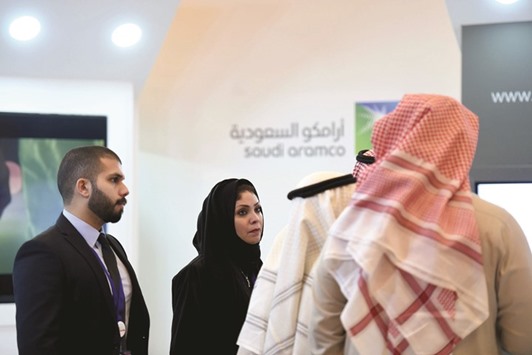The International Monetary Fund yesterday maintained its gloomy economic forecasts for Saudi Arabia due to low oil prices and lowered its expectations for the Middle East and North Africa overall.
The Saudi economy is set to grow by 1.2% in 2016, the lowest in seven years, and by 1.9% next year, the IMF said in its latest World Economic Outlook.
The downbeat predictions came despite the austerity measures taken by the kingdom to cut spending and boost non-oil revenues after posting a record budget deficit of $98bn last year.
Riyadh in December reduced huge subsidies on fuel products, electricity, water and other services in a bid to boost non-oil revenues and rationalise consumption.
“The steep decline in oil prices is weighing heavily on the macroeconomic outlook in Saudi Arabia,” said the IMF.
Fitch Ratings meanwhile lowered Saudi Arabia’s long-term credit rating, saying the plunge in oil prices had “major negative implications” for the world’s biggest crude exporter.
The agency downgraded the kingdom’s credit rating to AA- from AA, and said the outlook remains negative, indicating a further cut is likely.
The outlook remains negative, indicating that a further cut is likely.
Fitch said it had revised downwards its oil price assumptions for this year and next, to $35 and $45 a barrel, which “has major negative implications for Saudi Arabia’s fiscal and external balances”.
In February another agency, Standard & Poor’s, cut the kingdom’s credit rating by two notches to A-, citing the impact of lower oil prices on Saudi finances.
Last month, Moody’s placed Saudi Arabia and other Gulf oil producers on review for downgrades.
The fall led Riyadh to impose unprecedented cuts in its 2016 budget—which projects a deficit of $87bn—and to push economic diversification.
The government has said oil income made up 73% of revenue in 2015, compared with an average of 90% in the previous decade.
To cope with the fiscal gap, it raised retail fuel prices by up to 80% in December and cut subsidies for electricity, water and other services.
Referring to such efforts, Fitch said: “The pace of fiscal consolidation has increased.”
The IMF said additional spending restraint and revenue measures, including energy price reforms, containing the wage bill, prioritising capital spending and expanding non-oil tax revenues, will be necessary for Saudi and other oil exporters.
The only positive signal in the new IMF report was that growth projections were not cut further for the oil-dependent Saudi economy, which grew by 3.4% last year.
The economies of the Middle East, North Africa, Afghanistan and Pakistan as a whole are set to grow by 3.1% in 2016 and 3.5% in 2017, the report said.
That is worse than a January projection of 3.6% for each year. The outlook for the region, which grew by 2.5% last year, “has weakened considerably because of further declines in oil prices and intensifying conflicts and security risks,” the IMF said.
The downgrade affected both oil exporters and importers.
The IMF cut its combined growth projection for the oil-exporting countries, which include the Gulf States as well as Iran, Algeria, Libya and Yemen, to 2.9% this year from a forecast of 3.8% in October.

Saudi and foreign investors stand in front of the logo of Saudi state oil giant Aramco during the 10th Global Competitiveness Forum on January 25 in Riyadh. Fitch downgraded the kingdom’s credit rating to AA- from AA, and said the outlook remains negative, indicating a further cut is likely.
